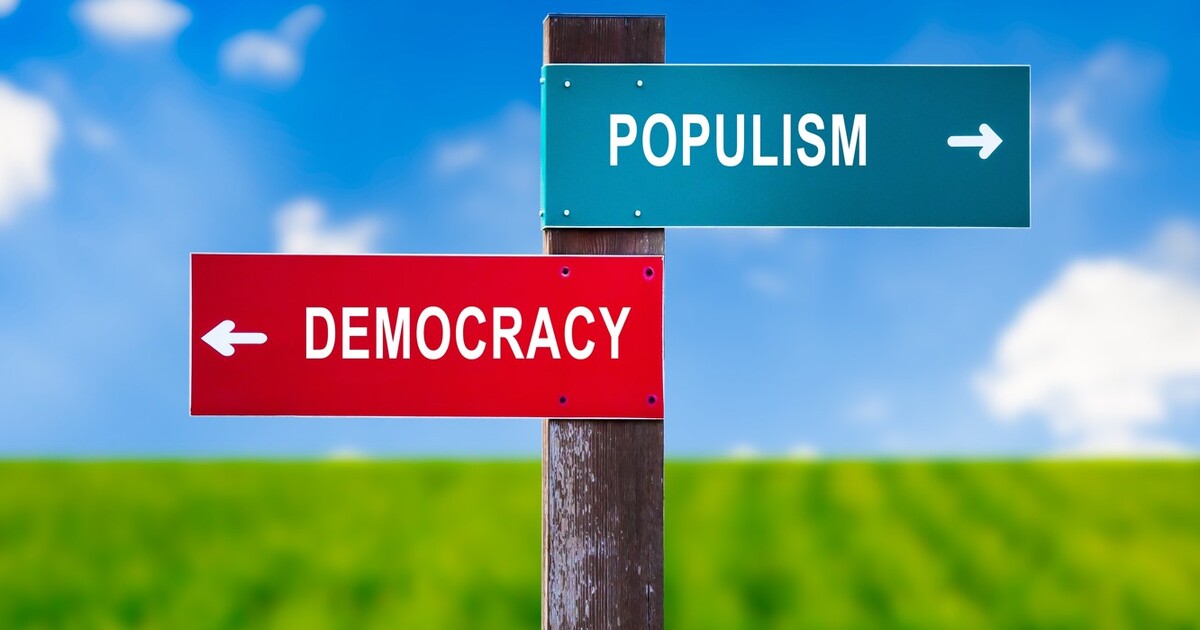Reclaiming Democracy: The Dangerous Playbook of Modern Populists
Though populism can, in theory, amplify marginalized voices and energize democracy, it often becomes a tool for weakening democratic institutions.
July 29, 2025

A Strategic Assessment Memo (SAM) from the Global Ideas Center
You may quote from this text, provided you mention the name of the author and reference it as a new Strategic Assessment Memo (SAM) published by the Global Ideas Center in Berlin on The Globalist.
In recent decades, populist leaders and parties have risen worldwide, claiming to defend “the people” against a distant, self-serving elite.
From Chavez and Maduro in Venezuela to Erdogan in Turkey and Orban in Hungary, these figures share familiar tactics — media control, economic handouts and anti-elite rhetoric — to consolidate power.
Across Europe, populist movements in France, Italy, Poland, the UK and Germany have echoed these strategies. Though populism can, in theory, amplify marginalized voices and energize democracy, it often becomes a tool for weakening democratic institutions.
Populism’s global reach
Populism, at its core, is an ideology that divides society into two camps: The “pure people” and the “corrupt elite.” It thrives on simple, emotive narratives that strike a chord with those who feel sidelined by traditional politics. Consider the United States’ rust belt and Yorkshire’s former mining regions — areas that have endured economic decline amid the shift from a manufacturing to a service-oriented economy.
Disillusionment is exacerbated by lower educational attainment, limited political engagement and pervasive distrust. These voters view mainstream politicians as out-of-touch elites who employ a technical language alien to their everyday experiences.
Furthermore, decades of divisive, drip-feed narratives from right-wing news outlets have fostered a sense of cultural and economic abandonment. This has paved the way for populist appeals that promise a return to lost prosperity and identity.
The “true voice of the people”
Populist leaders often present themselves as the true voice of the people, bypassing institutions to address deep-rooted grievances.
In Latin America, this typically takes the form of anticolonial rhetoric, with Chavez, Maduro and Morales portraying themselves as liberators from imperial legacies.
In the Middle East, Erdogan evokes Ottoman nostalgia while condemning Western interference. European populists draw on post-Communist disillusionment and national traumas, from Hungary’s Soviet past to Britain’s Brexit-driven identity crisis.
Yet, populism is not merely a rhetorical flourish. Research increasingly reveals a troubling pattern: Many of these leaders are not just reimagining democracy — they are dismantling it. Their tactics erode the checks and balances that sustain free societies, raising urgent questions about where populism ends and authoritarianism begins.
The common playbook
Populist leaders may hail from diverse cultural and political contexts, but their strategies are remarkably uniform.
Control over information is a cornerstone of the populist toolkit. In Venezuela, Chavez’s government introduced stringent laws to silence opposition, shutting down critical broadcasters and jailing journalists.
Shaping the narrative
Under Maduro, his successor, these efforts intensified, with media crackdowns peaking during economic and political crises. The result? A public sphere dominated by state-approved narratives.
Turkey’s Erdogan has taken a different but equally effective approach. By brokering deals with loyal businessmen, his regime amassed a media empire that drowns dissent.
After his 2016 coup attempt — widely seen as pretext for consolidation — Erdogan detained scores of journalists and built digital networks to police online discourse. Hungary’s Orban followed suit, with allies snapping up most of the country’s media outlets to ensure a pro-government echo chamber.
In Europe, populist parties have adapted this playbook for the digital age. From Poland’s Law and Justice Party to France’s National Rally, these groups deploy social media to sidestep traditional gatekeepers.
Targeted campaigns and viral content — think Farage’s Brexit memes — allow them to shape public opinion with precision, echoing the censorship-by-other-means seen in less democratic states.
Buying loyalty
Populists often secure allegiance through generous — if unsustainable — economic policies. In Venezuela, Chavez rolled out “Bolivarian Missions,” delivering healthcare, education and food subsidies to the poor.
These programs won him fervent support, even as oil revenues dwindled and the economy teetered. Maduro doubled down, clinging to handouts despite hyperinflation and mass shortages.
Turkey’s Erdogan has leaned on megaprojects — bridges, airports and housing schemes — alongside targeted welfare benefits to reward loyal constituencies.
In Hungary, Orban has funnelled public funds into patronage networks, enriching allies while neglecting broader fiscal health. These moves blur the line between policy and political bribery.
Europe’s populists have taken note. When it was in power, Poland’s Law and Justice Party rolled out family cash benefits, boosting its rural base. Italy’s League and Five Star Movement have pushed tax cuts and social spending, while in the UK, Brexit campaigners promised economic windfalls to “left behind” regions.
When these policies prioritize loyalty over sustainability, they risk fostering dependency and weakening economic resilience.
Rallying the base
Nothing unites populists like their disdain for “the elite” — a catch-all for politicians, bankers and intellectuals accused of betraying the common folk.
In Latin America, leaders denounce imperialism and local oligarchs. Chavez famously branded the United States the “empire of evil.” Erdogan has painted Western institutions and domestic critics as out-of-touch threats to Turkish values, while Orban champions “illiberal democracy” as a bulwark against globalist norms.
This rhetoric resonates globally. In Europe, parties like Germany’s Alternative für Deutschland (AfD) and Italy’s League rail against immigration, globalization and the EU, framing themselves as defenders of national sovereignty.
Farage’s Brexit crusade thrived on similar themes, pitting “the people” against a cosmopolitan establishment. Such messaging not only stokes nationalist zeal but also polarizes societies, making compromise — and institutional stability — harder to achieve.
Grievances of the past, power in the present
Populists excel at weaponizing the past. In Latin America, leaders frame their rule as a reckoning with colonial exploitation. Morales, for instance, tied his indigenous rights agenda to Bolivia’s history of marginalization, while Chavez invoked Simon Bolivar as a spiritual predecessor.
In Turkey, Erdogan’s appeals to Ottoman glory — and resentment of Western dominance — strike a deep chord. Europe’s populists, meanwhile, mine their own histories: Orban evokes Hungary’s subjugation under Soviet rule, while Farage and Le Pen stoke nostalgia for a pre-globalized, pre-EU era.
These narratives are more than sentimental: They are strategic. By casting modern policies as redress for historical wrongs, populists legitimize their assaults on present-day institutions. The past becomes a cudgel, wielded to silence critics and rally the faithful.
Manipulating institutions
Populist regimes often maintain the façade of democracy — elections, parliaments, courts — while hollowing out its substance. Venezuela’s descent is a stark example: Chavez and Maduro stacked the judiciary with loyalists, disqualified opposition parties and rigged electoral rules. Elections persisted, but as theater, not choice.
Turkey’s trajectory mirrors this. After the 2016 coup attempt, Erdogan purged judges and bureaucrats, cementing his grip on power.
Hungary’s Orban has rewritten electoral laws and created parallel judicial bodies, ensuring dissent is stifled before it can take root. Even in Europe’s older democracies, the signs are worrying.
Poland’s previous PiS-led government has clashed with the EU over judicial reforms, while Le Pen’s recent conviction for embezzling EU funds — decried by supporters as political persecution — hints at the same playbook: discredit institutions when they push back.
The United States under Trump offers another case study. His attacks on the press (“fake news”) and efforts to undermine the 2020 election’s legitimacy tested democratic norms, showing how populist tactics can threaten even robust systems.
Across these examples, the pattern is clear: Populists cloak authoritarianism in democratic trappings, betting that their base will cheer the charade.
A path forward?
Populism’s global ascent poses a profound test for democracy. At its best, it can amplify the voiceless and spur political renewal. At its worst, it becomes a Trojan horse for autocracy, as seen in Venezuela’s collapse, Hungary’s backsliding and Turkey’s repression. So how can societies respond?
Strengthening independent media is essential, as a free press — both traditional and digital — can challenge populist distortions and amplify diverse perspectives.
At the same time, centralist parties must resist mimicking populist rhetoric, which only legitimizes extremist narratives and weakens the credibility of inclusive policies.
This pattern has repeatedly shifted the Overton window rightward in countries like the UK, France and the United States, normalizing fringe positions.
Reinforcing institutional safeguards — such as judicial independence, electoral integrity and legislative oversight — is equally vital. The EU’s pressure on Poland and Hungary demonstrates that progress is possible with sufficient political will.
Finally, enhancing political literacy helps citizens see through demagoguery and distinguish empty slogans from substantive policy, making them less susceptible to authoritarian appeals.
Conclusion
Populism is not inherently evil. It reflects real grievances that demand attention. Yet when leaders like Chavez, Maduro, Erdogan, Orban or Trump turn it into a playbook for power, the stakes rise.
The conviction of Le Pen, the chaos Brexit brought and the crises in Caracas all underscore a shared truth: Democracy thrives on vigilance, not complacency.
By strengthening institutions, empowering citizens and addressing root causes, societies can reclaim the promise of populism — greater participation — without falling into its traps.
Education helps citizens critically assess political narratives and distinguish rhetoric from real democratic engagement.
This underscores the need for international cooperation, as populist movements exploit isolationism to undermine democratic foundations. Institutional reforms — such as stricter campaign finance rules and better electoral systems — are also crucial to defend against manipulation.
Only through unwavering vigilance and active participation can we not merely preserve but truly invigorate our democratic institutions.
Will we allow populism to erode our future, or will we mobilize our collective resolve and every available resource to safeguard democracy from collapse? Ultimately, the fate of our democracy is in the hands of society collectively.
Takeaways
Populism, at its core, is an ideology that divides society into two camps: The “pure people” and the “corrupt elite.”
Decades of divisive, drip-fed narratives from right-wing news outlets have fostered a sense of cultural and economic abandonment. This has paved the way for populist appeals that promise a return to lost prosperity and identity.
Populist leaders are not just reimagining democracy — they are dismantling it.
Control over information is a cornerstone of the populist toolkit.
Populists often secure allegiance through generous — if unsustainable — economic policies.
Nothing unites populists like their disdain for “the elite” — a catchall for politicians, bankers and intellectuals accused of betraying the common folk.
Populist regimes often maintain the façade of democracy — elections, parliaments, courts — while hollowing out its substance.
Populism’s global ascent poses a profound test for democracy. At its best, it can amplify the voiceless and spur political renewal. At its worst, it becomes a Trojan horse for autocracy.
Pitting “the people” against a cosmopolitan establishment not only stokes nationalist zeal but also polarizes societies, making compromise — and institutional stability — harder to achieve.
Populism is not inherently evil. It reflects real grievances that demand attention. Democracy thrives on vigilance, not complacency.
A Strategic Assessment Memo (SAM) from the Global Ideas Center
You may quote from this text, provided you mention the name of the author and reference it as a new Strategic Assessment Memo (SAM) published by the Global Ideas Center in Berlin on The Globalist.


